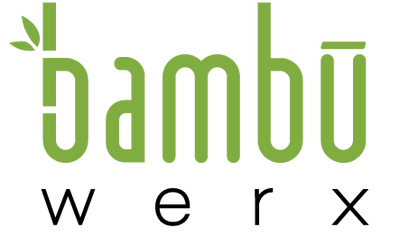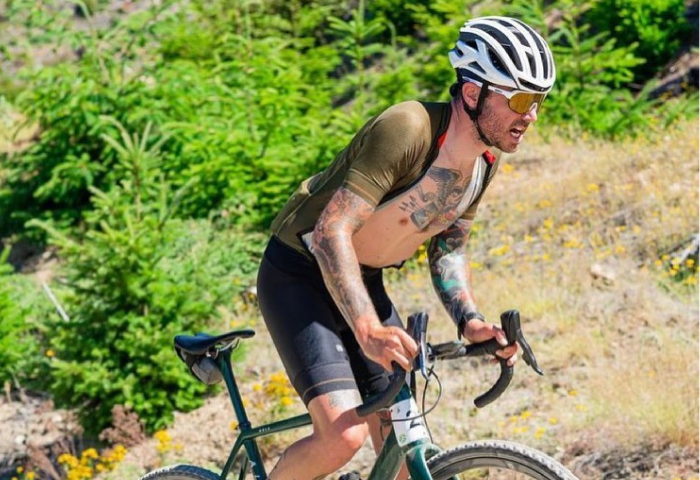Thank you for being part of the bambū werx family. Cynthia and I really do appreciate the support you've shown us over the past three years!
This photo was taken at the recent IRONMAN (all female) World Championship in Kona, Hawaii. Featured in it are two people who've been positive influences in my life: Mark Allen (friend, coach, industry icon) and Frank Tate (best friend of 38 years, consigliere, business partner). I (Larry) choose to highlight these two individuals because they share a belief in and consistently demonstrate the practices of inspiring those around them to "live a great story" and be the "best version of themselves."
Mark and Frank likewise agree that all the external motivation in the world simply doesn't matter, if internally, one's heart and head are not in the right place. So often we as athletes focus on performance, training programs, diet, and other external data (i.e., the "what's" or "how's"), when true success (and a deep sense of fulfillment) actually stems from what's inside of us; in other words, our "why."
So while heading into the off-season, we encourage you to go beyond simply thinking about what you can do to accomplish your 2024 goals... and to consider why you're pursuing them and who can help you get there: the people in your circle of friends-n-family that believe in you!
Cynthia and I hope you enjoy these monthly updates. Please don't hesitate to reach out with suggestions on topics you'd like us to cover. And if for whatever reason you prefer not to receive our newsletters, just let us know. We hate junk mail too!
Yours in good health,
Larry & Cyn
--------------------------------------------------

In an industry rife with economic challenges, paper recycling shines as an encouraging sub-sector. Because the paper and wood products industry is inherently circular (paper is made from trees, a renewable resource), paper recycling lends to certain fiscal economies that other products (plastics, metals, etc.) can't yet achieve.
Some interesting statistics about paper recycling:
- Every Sunday, nearly 90% of the recyclable newspapers in the U.S. are thrown away. That's equivalent to dumping 500,000 trees into a landfill every week.
- Every ton of paper recycled paper can save energy equivalent to producing 165 gallons of gasoline.
-
Producing one ton of recycled paper uses 64% less energy, and 58% less water than to producing one ton of paper products from virgin wood pulp.
The nearly ubiquitous blue basket (above) in most offices today is surprisingly successful: nearly 2/3 of all paper in the United States is now made from recycled products. Yet, while the vast majority of American (over 94%) have access to paper recycling facilities, many simply aren't aware of proper recycling guidelines, which if followed, could further grow our paper conservancy efforts:
-
Wishcycling occurs when one puts something into recycling bin hoping it can be recycled. Styrofoam, dirty food containers, and bubble-wrap typically can't be recycled.
- Cardboard, while a readily recycled material, needs to be properly categorized and prepared for recycling. Chipboard (wax-coated cardboard often used to store food products, e.g.,. cereal boxes and milk cartons) often requires special processing facilities. Also, corrugated cardboard boxes need to be broken down and flattened prior to recycling.
- Affixed materials like stickers/labels, staples, and plastic address covers on envelopes should all be removed before inserting paper into a recycling bin, so as not to interfere with the paper shredding/pulping process.
- Check local recycling guidelines to ensure one understands what can or cannot be recycled locally.
Lastly, in addition to practicing proper paper recycling, we encourage you to consider supporting ecology or recycling-based organizations like One Tree Planted, with whom we partner at bambū werx. Together we can make a difference!
--------------------------------------------------

Ugh... we messed up! Told you we'd start publishing weekly training tips on running, cycling, swimming, and nutrition and then failed to follow through. We apologize!
Starting the week of Nov 13th, we'll begin publishing some high-level tips and best practice suggestions from a variety of endurance sports domain experts. Because many of our family and friends are coaches, we can't necessarily endorse one over another (that wouldn't be fair). So, we plan to rotate our sources and reference a variety of opinions, so as to provide different perspectives. Then if something strikes a chord with you, let us know! We'll happily refer you to the coach/expert.
--------------------------------------------------

John is a 37-year old elite swimmer, endurance sports coach, amateur chef, and male model who lives in Bristol (outside London), United Kingdom. John competed internationally in swimming before getting into triathlon in his early 20's, then moved into coaching a number of years later.
John's approach to coaching is "reality-based," in the sense that he seeks to help his clients find balance in their lives. In general, John contends endurance athletes are often "running from something." In his own past, John used sport to get away from whatever was going on in life/his head - whereas now he leverages sports as an opportunity to explore and enjoy things. It doesn't mean that he doesn't push himself (or his clients) any more or less - simply that he feels better about doing it and doesn't guilt out over missing training sessions.
For more on John and his coaching practice, please see here
tri coaching UK.
--------------------------------------------------
If you've made it this far... thank you!
In closing each month, we give our little mascot, Annie, a place to offer up some final encouragement to you as a friends, family, and supporters. For November 2023, Annie says:
Life is short. Do stuff that matters!











Leave a comment